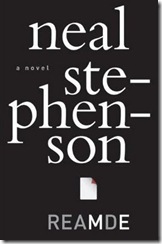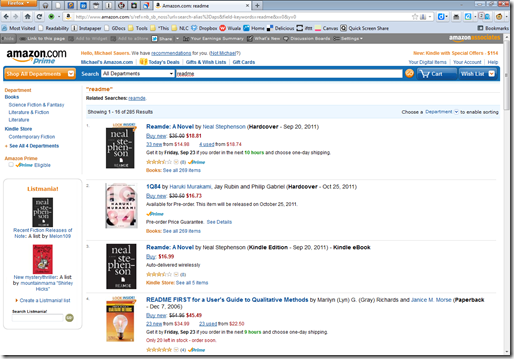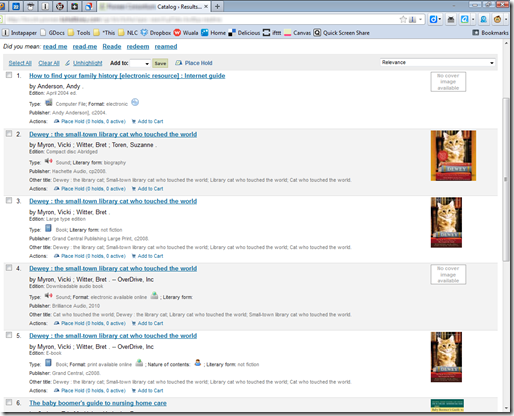 Take a look at the cover of the new Neal Stephenson door-stopper shown right. Ok, now let’s search for the title Readme in Amazon.com. Here’s what we get:
Take a look at the cover of the new Neal Stephenson door-stopper shown right. Ok, now let’s search for the title Readme in Amazon.com. Here’s what we get:
The book came right up. Now let’s pick a random library catalog and search for the same title: Readme.
Huh? A genealogy book, several editions of Dewey and one on nursing home care. What’s up?
Well, the problem is, the title of Neal Stephenson’s new novel isn’t Readme it’s Reamde. Spell them out-loud if you’re not seeing it.
I put this book on my Amazon.com wish list months ago, ordered it last week, received it two days ago, and read the first chapter before I realized that the title wasn’t Readme but Reamde. Here’s the best part, despite that error on my part, Amazon still found and sent me the book I wanted. How many patrons are going to make this same mistake and maybe think that the library doesn’t have the book?
(I’m not picking on any particular library here. I’ve run some tests and I’ve yet to find a library that successfully cross-references the wrong title with the correct one.)
Check your library’s catalog. Let me know if you’ve got this covered. If not, how can we deal with this? (And no, just saying “well, if the title doesn’t work they should search for the author” isn’t a solution, it’s an excuse.)


All it should take is putting “Readme” in a 246 field. And, of course, an awareness on the part of the cataloger that people might search for it as Readme. (It apparently didn’t occur to the folks at the Library of Congress.)
I think the point here is that Amazon is doing this automatically without human intervention. In other words a very good “did you mean?” feature. New or next generation Library catalogues like Encore have this feature but my impression is most isnt very good, i believe the one we have here does fairly simplistic matching to closest titles (for phrases) which probably fails here (cant test no fiction here).
suspect Amazon has fuzzy search of some kind weighted by popularity of books so the ones people are mostly likely searching for popups first. Its interesting amazon shows no results for readme? I suspect for our catalgue it probably wont even kick start the did you mean function cos there are so many hits for readme.
All cataloging practice assumes you’ll pay attention to what you’re doing. My experience with programming has been the same way … I wonder if Amazon’s algorithms did this, or if human intervention was needed? No way to see into their black box.
I’d also put “Readme” in a 246, but preceded by text to the effect of “Frequently misspelled”.